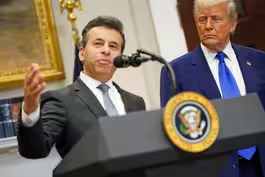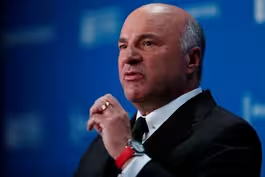
Provision in GOP bill puts millions at risk of losing SNAP
Clip: 5/29/2025 | 6m 32sVideo has Closed Captions
Provision in GOP budget bill puts millions at risk of losing SNAP benefits
A program facing sweeping reform and cuts in the Trump legislative agenda is the Supplemental Nutrition Assistance Program, once known as food stamps. SNAP reaches more than 41 million low-income Americans who receive an average of about $187 in food benefits each month. Lisa Desjardins breaks down the proposed changes.
Problems playing video? | Closed Captioning Feedback
Problems playing video? | Closed Captioning Feedback
Major corporate funding for the PBS News Hour is provided by BDO, BNSF, Consumer Cellular, American Cruise Lines, and Raymond James. Funding for the PBS NewsHour Weekend is provided by...

Provision in GOP bill puts millions at risk of losing SNAP
Clip: 5/29/2025 | 6m 32sVideo has Closed Captions
A program facing sweeping reform and cuts in the Trump legislative agenda is the Supplemental Nutrition Assistance Program, once known as food stamps. SNAP reaches more than 41 million low-income Americans who receive an average of about $187 in food benefits each month. Lisa Desjardins breaks down the proposed changes.
Problems playing video? | Closed Captioning Feedback
How to Watch PBS News Hour
PBS News Hour is available to stream on pbs.org and the free PBS App, available on iPhone, Apple TV, Android TV, Android smartphones, Amazon Fire TV, Amazon Fire Tablet, Roku, Samsung Smart TV, and Vizio.
Providing Support for PBS.org
Learn Moreabout PBS online sponsorshipGEOFF BENNETT: Last night, we looked at# the House Republican plan for Medicaid## in the Trump legislative agenda.
Tonight, we focus on another program## facing sweeping reform and cuts in that budget# bill.
That's SNAP, the Supplemental Nutrition## Assistance Program, once known as food stamps.
The# anti-hunger program reaches more than 41 million## low-income Americans, who receive an average# of about $187 in food benefits each month.## The Congressional Budget Office projects# proposed changes would save billions of## dollars, but millions of people would# no longer be eligible for the program.
Our Lisa Desjardins is here.
So, Lisa, what cuts do House Republicans# want to make to this program?
LISA DESJARDINS: These would be the most sweeping## reductions in this program since the# Food Stamp Act was passed in 1964.
House Republicans, one, would make states pay# more for this, and, number two, implement more## requirements so eventually fewer people would# benefit.
First of all, those requirements are## work requirements, and they would apply to more# people.
They would now force states to pay a## share of this program.
And they would limit the# beneficiaries to U.S. citizens only.
All in all,## that would save just under $300 billion,# according to the Congressional Budget Office.
That is money that House Republicans would# use to pay for tax cuts in this bill.
GEOFF BENNETT: And what impact# might the work requirement have?
LISA DESJARDINS: It's significant.
Now, the focus here is on the most.. and that is for able-bodied people right now# who don't have dependents.
It's 80 hours a## month.
That can be work or volunteering.# So let's look at how they're expanding it,## because the age is what has been# expanding in this requirement.
In 2022, this requirement was for people up to# age 49, but then it changed so that currently## it is required of people up to age 54.
House# Republicans would expand it again by more so## that everyone up to age 64 under this program# would be required to meet those 80 hours a month.
It also would change for people with# children.
Right now, if you have a child,## you are not required to meet this 80 hours# of work.
But the House plan would require## you to do it if you have a child who is# 7 years old or more.
Also mentioning,## if you're a married couple, only one person in# the marriage has to do the work requirement.
So,## if you're a single parent, you have to do# that, and you're also single parenting.
All right, so what does that mean overall, the# numbers?
Let's take a look.
The Congressional## Budget Office says these work requirements would# save about $100 billion, and that's largely## because more than three million people would# be out of the program as a result.
Most of them## are adults without children, and states would# not be able to create waivers to keep them in.
Now, even though these are adults that are# coming off of the program, CBO believes,## as an indirect effect, something like 400,000 kids## would lose school lunches as well,# though conservatives question that.
GEOFF BENNETT: So those are the numbers.
What's# the underlying debate that's fueling all of this?
LISA DESJARDINS: This is a very classic# ideological and intense academic debate as well.
For conservatives, what's central here is how to# get out of the cycle of poverty.
They see safety## net programs as an entry point into that cycle.# They want more self-sufficiency.
So we talked to## experts who believe that the work requirement# here is not too much of a burden for SNAP.
And, specifically, we spoke to Angela# Rachidi of the left -- the right-leaning AEI.
ANGELA RACHIDI, American Enterprise Institute:# The participation rate among eligible is close## to 90 percent.
In some states, it's even# 100 percent.
And so SNAP is available.
It's## robust.
I think a very small work requirement# that can be satisfied through things even like## volunteering.
I don't think that's an expectation# that's too high for much of this population.
LISA DESJARDINS: Now, they think that# this is something that's helpful,## getting people more to work.
But, on the left, they see the exact reverse# he.. are something that help people survive and# get strength so that they can get back to## work and get more self-sufficient.# They think that work requirements,## what they do is, they hurt people while they're# trying to get on their feet.
And they point out## that many people who are on SNAP are in# between jobs, looking for jobs right now.
We spoke to Lauren Bauer, who is with# the left-leaning Brookings Institution.
LAUREN BAUER, Brookings Institution: SNAP# work requirements punish the unemployed.## Searching for jobs, for work is not an# allowable use of your time when you're## being subject to SNAP work requirements.# And so what we end up doing is punishing## people who can't find a job within# three months.
During recessions,## that is the vast, vast majority of people# who become enrolled ON the program.
LISA DESJARDINS: It's also harder on# older Americans as well in the work force.
Now, there is not a lot of research that# really pins down what happens with these## work requirements.
There is economic theory# that there is a kind of demotivating factor## if you don't have a work requirement.
But on# the other hand, there's empirical evidence that## says people who are unemployed and get SNAP# benefits find better and longer-lasting jobs.
GEOFF BENNETT: And the other Republican goal here## is to push more responsibility# for this program to the states.
LISA DESJARDINS: That's right.
And this is a bi.. not pay anything for the benefits on SNAP.# But starting in 2028, under this proposal,## states would pay at least 25 percent.# And that would increase if the states## have a higher error rate.
So what# we're talking about right now is,## those are states with a higher error rates# currently is 25, about half of the country.
They would pay 25 percent of the benefits in# their state.
There's some time to work out the## error issues here.
But, just this week,# Wisconsin, which has a low error rate,## said that this would cost it hundreds of millions# of dollars and sent out a warning about that.
GEOFF BENNETT: And we should explain# what that means.
What's an error rate?
LISA DESJARDINS: An error rate means that you# have paid someone on SNAP too much or too little.
GEOFF BENNETT: Got it.
I want to ask you, with Elon Mu.. the future of the DOGE austerity plan?
I know you# have reported on that extensively on the Hill.
LISA DESJARDINS: Well, some# things, like for example,## the reorganization of the# State Department and USAID,## are moving.
The State Department just# transmitted that plan to Congress today.
But other things like the cuts, which,# frankly, have sometimes been hard to track,## have not been congressionally approved# at all.
Some members would like to do## that.
But I don't think the votes# are there right now in the Senate.
There is one thing, cuts to the# Corporation for Public Broadcasting,## PBS and NPR.
We do expect a rescission# package perhaps.
I expect it, I'm told,## in Congress next week.
And# we will follow that closely.
GEOFF BENNETT: Lisa Desjardins,# our thanks to you, as always.
LISA DESJARDINS: You're welcome.
FDA head defends changes to COVID vaccine recommendations
Video has Closed Captions
Clip: 5/29/2025 | 9m 3s | FDA commissioner defends changes to COVID vaccine recommendations (9m 3s)
How Israel is responding to U.S. proposals to pause Gaza war
Video has Closed Captions
Clip: 5/29/2025 | 5m 11s | How Israel is responding to latest U.S. proposals to pause war in Gaza (5m 11s)
Immigration attorney weighs in on Trump's deportations
Video has Closed Captions
Clip: 5/29/2025 | 7m 21s | Immigration attorney weighs in on Trump's deportations and court rulings against him (7m 21s)
Kevin O’Leary on Trump's trade war and battle with Harvard
Video has Closed Captions
Clip: 5/29/2025 | 6m 48s | Kevin O’Leary on Trump's trade war and battle with Harvard (6m 48s)
Met opens Arts of Oceania galleries showcasing Pacific works
Video has Closed Captions
Clip: 5/29/2025 | 7m 54s | The Met opens reimagined Arts of Oceania galleries showcasing works from the Pacific (7m 54s)
News Wrap: Trump and Fed Chair Powell meet at White House
Video has Closed Captions
Clip: 5/29/2025 | 5m | News Wrap: Trump and Fed Chair Powell meet at White House (5m)
What's next for Trump's tariffs amid legal back and forth
Video has Closed Captions
Clip: 5/29/2025 | 4m 17s | What's next for Trump's tariffs amid legal back and forth (4m 17s)
Providing Support for PBS.org
Learn Moreabout PBS online sponsorshipSupport for PBS provided by:
Major corporate funding for the PBS News Hour is provided by BDO, BNSF, Consumer Cellular, American Cruise Lines, and Raymond James. Funding for the PBS NewsHour Weekend is provided by...


















